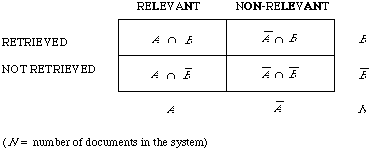|
|
148 |
|
|
|
|
relevant to an information need if and only if it contains at least one sentence which is relevant to that need.
Earlier on I stated that this notion of relevance was only of limited use at the moment. The main reason for this is that the kind of system which would be required to implement a retrieval strategy which would retrieve only the logically relevant documents has not been built yet. However, the components of such a system do exist to a certain extent. Firstly, theorem provers, which can prove theorems within formal languages such as the first-order predicate calculus, have reached quite a level of sophistication now (see, for example, Chang and Lee[7]). Secondly, Winograd's system is capable of answering questions about its simple universe blocks in natural language. In principle this system could be extended to construct a universe of documents, that is, the content of a document is analysed and incorporated into the universe of currently 'understood' documents. It may be that the scale of a system of this kind will be too large for present day computers; only the future will tell.
Saracevic[8] has given a thorough review of the notion of relevance in information science. Robertson[9] has summarised some of the more recent work on probabilistic interpretations of relevance.
Precision and recall, and others
We now leave the speculations about relevance and return to the promised detailed discussion of the measurement of effectiveness. Relevance will once again be assumed to have its broader meaning of 'aboutness' and 'appropriateness', that is, a document is ultimately determined to be relevant or not by the user. Effectiveness is purely a measure of the ability of the system to satisfy the user in terms of the relevance of documents retrieved. Initially, I shall concentrate on measuring effectiveness by precision and recall; a similar analysis could be given for any pair of equivalent measures.
It is helpful at this point to introduce the famous 'contingency' table which is not really a contingency table at all.
|
|
|
148 |
|
|
|
